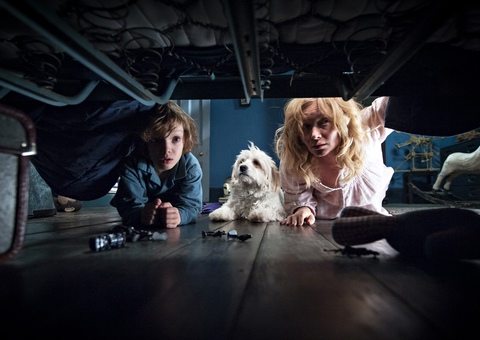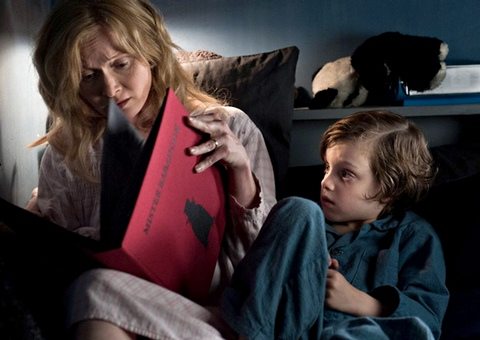Colonisation is a brutal process, one in which everyone involved is debased. That is the clear message of Jennifer Kent’s The Nightingale, and the theme that has dominated its early coverage. But underneath that stark truth are complex power dynamics that call for more nuanced discussion.
Set in 1825 – during the Black Wars in Van Diemen’s Land – Clare (Aisling Franciosi) is an indentured Irish convict servant, in bondage to the cruel Lieutenant Hawkins (Sam Claflin). She is overdue her ticket of leave and wants to be with her husband and child, but Hawkins refuses to relinquish his control. His abuse of power culminates in horrific sexual and physical violence – depicted so unflinchingly by Kent that some viewers have walked out of cinemas – that strips Clare of everything she holds dear. Hiring a black guide Billy (Baykali Ganambarr), Clare stalks Hawkins and his small party to Launceston – where they are being guided by Uncle Charlie (Charlie Jampijinpa Brown) – in order to punish them.
Vengeance is a driving force in Clare’s story, but The Nightingale – which won the special jury prize when it premiered in Venice, and just took home the critics’ prize at Melbourne film festival – is more layered than a simple revenge tale. Billy is a Letteremairrener man, whose family have also been murdered by the colonists – and as he and Clare travel across the country, her racism softens, and their relationship becomes a space in which to explore the shared trauma and loss they have both suffered at the hands of white men.
Kent’s extraordinary craft shines through the world she has recreated, and in her seamless use of magic realism to reveal Clare’s psychological world. She has elicited a world-class performance from Franciosi, in a demanding and harrowing role. Ganambarr is charismatic, with strong physicality, and Kent’s collaboration with the Tasmanian Aboriginal community – including elder Jim Everett – brings cultural authenticity to his characterisation. (The Nightingale also claims to be the first full-length feature to use Palawa Kani, a dialect reconstructed from near-extinct Indigenous Tasmanian languages). Claflin, Damon Herriman and Harry Greenwood make sinister colonialists, and Charlie Shotwell, as the young orphan Eddie, is captivating each time he appears.
All these white men grow more inhumane as they undertake the callous, violent work of clearing the colony of Aboriginal people and their culture, through point blank mass murders, sexual assaults, and the debasement and defiling of men, women and children.
Violence in The Nightingale is unrelenting. It is graphic but, given the world the film takes place in, rarely gratuitous. The audience is left in no doubt about the savagery by which Aboriginal people were dispossessed of the land during the ferocious inhumanity and genocide that Australia was founded on – an important acknowledgement as the country continues to engage in discussions about constitutional recognition and treaty.
But in its ambitious attempt to interrogate the complex power dynamics between the coloniser and the colonised, Clare’s story steps into murkier territory, which it traverses it less successfully.
And this is clearly Clare’s story: the film starts with Clare and ends on her gaze, privileging her point of view. It is from Clare’s perspective that the connections between her situation and that of Aboriginal people like Billy are explored. The viewer is asked to sympathise with the similarities of their plights: both have had their families taken from them, both sing in their traditional tongues (Clare in Gaelic), both are powerless within the colonial society being imposed on them. Clare goes to great lengths to explain that she is Irish, not English: she hates the English, she is also of a conquered people. We have witnessed her callous torture within the new colony. In these very real ways, she is a victim.
But while comparing the exploitation of Aboriginal people with other groups oppressed within the colonial system (women, convicts, the Irish) is fertile ground for dramatic exploration, it is also a minefield – one which Kent navigates misguidedly. Clare is still a part of the colonising force. She had her own hut and ambitions for life on Australian soil, land cleared of Aboriginal people. She is a racist – she calls Billy “boy”; she initially believes him to be a cannibal, and keeps a gun pointed on him; she is indifferent to the lethal consequences her impulsive decisions have on him. However little power she has, he has much, much less.
Every societal group that is co-opted in the colonial process suffers in a different way, but it is dangerous to link those marginalised within the colonial state to those being colonised. The sliding scale of suffering among those within the colony makes little difference to the Aboriginal group whose land they stole.
Aboriginal women, meanwhile, are left in the usual trope. We see only one. Lowanna (brought to life by the luminous Magnolia Maymuru) is raped and then murdered, with no characterisation. All we know is that she is even more disposable than both white women and black men. For a film so focused on colonial violence against women, the perfunctory and superficial interrogation of how that dynamic plays out for Aboriginal women is a serious flaw that plays into a colonial cinematic tradition. Lowanna’s ephemeral portrayal in the Nightingale begs the question: who is the intended audience for this film? It may well hit raw nerves with Indigenous women, who have long felt marginalised in Australian cinema.
The film’s final scene seems to undercut the comparisons it made between the plights of its two leads. During what feels like Billy’s inevitable death, Clare sings her Irish song in Gaelic. It’s not English, but in Australia it’s still a foreign, colonising language that she is singing on his traditional land.
In the end, there is no way to escape your own complicity when you are part of the colonial system – no matter how powerless you yourself are. That is another brutal aspect of colonisation – and credit to Kent for exploring it. It takes a bold and brave storyteller to begin these difficult and complex but urgent conversations.
• The Nightingale has been released in the UK and US, and opens in Australian cinemas from Thursday 29 August
• Larissa Behrendt is a Eualeyai/Kamillaroi lawyer, academic, novelist and film-maker











